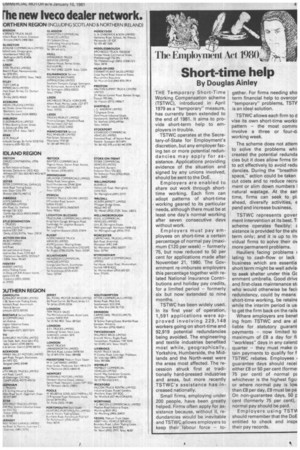Short-time help
Page 43

If you've noticed an error in this article please click here to report it so we can fix it.
By Douglas Ainley
THE Temporary Short-Time Working Compensation scheme (TSTWC), introduced in April 1979 as a "temporary" measure, has currently been extended to the end of 1981. It aims to provide short-term help to employers in trouble.
TSTWC operates at the Secretary-of-State for Employment's discretion, but any employer facing ten or more potential redundancies may apply for assistance. Applications providing evidence of the situation and signed by any unions involved, should be sent to the DoE.
Employers are enabled to share out work through shorttime working. Each firm can adopt patterns of short-time working geared to its particular needs, although there must be at least one day's normal working after seven consecutive days without work.
Employers must pay employees on short-time a 'certain percentage of normal pay (maximum £120 per week) formerly 75, but now reduced to 50 per cent for applications made after November 21, 1980. The Government re-imburses employers this percentage together with related National Insurance Contributions and holiday pay credits, for a limited period formerly six but now extended to nine months. , TSTWC has been widely used. In its first year of operation, 1,591 applications were approved involving 229,148 workers going on short-time and 92,919 potential redundancies being avoided. The engineering and textile industries benefited most while, geographically, Yorkshire, Humberside, the Midlands and the North-west were the areas most affected. The recession struck first at traditionally hard-pressed industries and areas, but more recently TSTWC's assistance has increased nationally.
Small firms, employing under 200 people, have been greatly helped. Firms often apply for assistance because, without it, redundancies would be inevitable and TSTWC allows employers to keep their, labour force to gether. For firms needing sho term financial help to overcor "temporary" problems, TSTV is an ideal solution.
TSTWC allows each firm to d vise its own short-time workir pattern the most Gomm( involve a three or four-di working week.
The scheme does not attem to solve the problems whi, created the potential redunda cies but it does allow firms tin to act effectively to avoid redu dancies. During the "breathin space," action could be taken cut costs and to reduce recru ment or slim down numbers I natural wastage. At the san time, firms can seek to pi; ahead, diversify activities, e pand and increase business.
TSTWC represents gover ment intervention at its best. TI scheme operates flexibly; e sistance is provided for the shE term, only; and it is up to in( vidual firms to solve their ov more permanent problems.
Hauliers facing problems I lating to cash-flow or lack business which are essentia short term might be well advisi to seek shelter under this Gc ernment umbrella. Good drive and first-class maintenance str who would otherwise be facii redundancy, could by means short-time working, be retaine while the interim period is us, to get the firm back on the rails Where employers are benel ing from TSTWC and are al liable for statutory guarant payments now limited to maximum of £8 a day for fi "workless" days in any calend quarter they must make c( tam n payments to qualify for f TSTWC rebates. Employees I guarantee days should recei either £8 or 50 per cent (form& 75 per cent) of normal pE whichever is the highest figui or where normal pay is lovv than £8 per day, £8 must be pa On non-guarantee days, 50 p cent (formerly 75 per cent), normal pay should be paid.
Employers using TSTV) should remember that the DoE entitled to check and inspE their pay records.




























































































